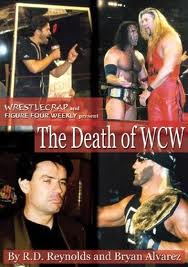 During the late ’90s, when professional wrestling was at its apex, newsletters and websites such as Wrestle Crap and Figure Four Weekly were also at their highest points in popularity as well. Because of that, it makes sense that two of the most prominent writers for those sites, R. D. Reynolds and Bryan Alvarez, have crammed all of their knowledge of that era and written a book about WCW, a company they claim should have never died.
During the late ’90s, when professional wrestling was at its apex, newsletters and websites such as Wrestle Crap and Figure Four Weekly were also at their highest points in popularity as well. Because of that, it makes sense that two of the most prominent writers for those sites, R. D. Reynolds and Bryan Alvarez, have crammed all of their knowledge of that era and written a book about WCW, a company they claim should have never died.
While it’s incredibly in-depth, going through essentially every week of Monday Nitro history, there aren’t many sources that confirm so many of their opinions. One look at the source list at the end of the book proves that. That hurts their credibility more if you’re a serious reader or a fan that wants more than what they read on websites, written by people that claim to be in the know, but know much less than they think.
While it’s a quick and entertaining read, it’s obvious that these two authors have their favorite wrestlers and that hurts the book more than anything. Saying that Ric Flair was a ratings draw in 97 and 98 is one thing, but to say he and Bill Goldberg were the only two draws the company had in the new millennium is nonsense. Their constant references to the mistakes WCW made with Flair’s career are totally true, but to think and consistently pontificate that Flair could have stopped Raw’s climb is ludicrous.
Using ratings and the myriad of bad decisions the company made as a guide, the book is engaging, especially if you lived through the era. Reading about all the money the company wasted is telling of their nature and goes a long way in showing how bad the company was doing business. However, there is not one source that confirms any of this.
In the forward of the book, the authors thank Bobby Heenan and Dave Meltzer for helping them clean up the facts in the book. Why aren’t they quoted? (Heenan has a sparse number of quotes, but Meltzer is nowhere to be seen) Â Where is the evidence that supports all these wild claims?
The problem here is that so many of the dirt-sheet writers take what one source tells them as fact. They aren’t journalists. While it’s obvious many of the things said in this book are true, mainly because they’ve been told countless times in other books, the fact remains that this book is written like a piece for a wrestling site and not like a tell-all book.
In the end, if you’re a casual fan of the industry, this book will blow your mind, especially if you’re reading about many of these things for the first time. For a knowledgeable fan and a seasoned reader however, the things that you learn from reading are interesting, but lack the support a book like this, that makes so many claims, must have, in order to be a real success.


Leave a Reply